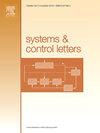基于分布式目标估计的多机器人系统协同指向控制
IF 2.1
3区 计算机科学
Q3 AUTOMATION & CONTROL SYSTEMS
引用次数: 0
摘要
针对单一目标下的多机器人系统,提出了一种新的协同指向控制框架。现有的方法利用相邻机器人与目标之间的几何关系来设计协同指向控制器,这涉及到复杂的几何分析,阻碍了我们在复杂环境中的应用。其中,所有机器人和目标在同一平面内是静止的,它们的部署是任意的。此外,每个机器人都知道自己的全局位置。在不丧失一般性的前提下,我们假设两个领头机器人已经指向目标,并且它们三个不共线。这种设置实际上隐式地确定了目标的位置,但这是两个领导机器人以及其他机器人所不知道的。因此,我们设计了一个分布式估计器来产生目标在每个机器人上的位置的渐近估计,从而给出每个非领导机器人的期望姿态角的渐近估计。然而,期望的姿态角的估计遵循特定的几何关系,从目标的位置估计,不能等于相应的机器人的位置。采用状态相关的切换策略使分布式目标估计器远离这个奇点。通过跟踪期望姿态角的估计值,每个非领导机器人调节自己的姿态角以渐近地指向目标。最后,通过数值仿真验证了该框架的有效性。本文章由计算机程序翻译,如有差异,请以英文原文为准。
Cooperative pointing control of multi-robot systems via distributed target estimation
In this paper, we propose a novel cooperative pointing control framework for multi-robot systems subject to one target. The existing approach exploits the geometric relations among neighboring robots and the target to design cooperative pointing controllers, which involves intricate geometric analysis and hinders us from applications in complex environments. Herein, all the robots and the target are stationary within the same plane, and their deployment is arbitrary. Besides, each robot knows its own global position. Without loss of generality, we assume that, two leader robots already point at the target and the three of them are not collinear. This setup in fact determines the target’s position implicitly, which but is unknown to the two leader robots as well as others. We thus design a distributed estimator to yield an asymptotic estimate of the target’s position at each robot, which gives the asymptotic estimate of the desired orientation angle for each non-leader robot. However, the estimate of the desired orientation angle follows specific geometric relations from the estimate of the target’s position that cannot be equal to the position of the corresponding robot. A state-dependent switching strategy is employed to enable the distributed target estimator to stay away from this singularity. Through tracking the estimate of the desired orientation angle, each non-leader robot regulates its own orientation angle to point to the target asymptotically. Finally, numerical simulations are presented to illustrate the validity of this framework.
求助全文
通过发布文献求助,成功后即可免费获取论文全文。
去求助
来源期刊

Systems & Control Letters
工程技术-运筹学与管理科学
CiteScore
4.60
自引率
3.80%
发文量
144
审稿时长
6 months
期刊介绍:
Founded in 1981 by two of the pre-eminent control theorists, Roger Brockett and Jan Willems, Systems & Control Letters is one of the leading journals in the field of control theory. The aim of the journal is to allow dissemination of relatively concise but highly original contributions whose high initial quality enables a relatively rapid review process. All aspects of the fields of systems and control are covered, especially mathematically-oriented and theoretical papers that have a clear relevance to engineering, physical and biological sciences, and even economics. Application-oriented papers with sophisticated and rigorous mathematical elements are also welcome.
 求助内容:
求助内容: 应助结果提醒方式:
应助结果提醒方式:


